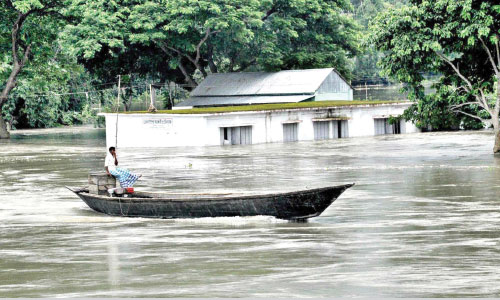Food, drinking water crisis stalks flood-hit people
Around 12 lakh flood-affected people in north-western and north-eastern districts are now in the grip of severe crisis of food and drinking water while water-borne diseases have started spreading, with floods lingering in many areas.
The flood situation deteriorated further in Nilphamari, Lalmonirhat, Kurigram, Gaibandha, Jamalpur, Bogra, Sirajganj, Natore, Rajbari, Manikganj, Munshiganj and Shariatpur while the blood water has started receding in Sylhet and Sunamganj.
National Disaster Response Coordination Centre in-charge Dalil Uddin said around 12 lakh people were affected so far by the flood caused by onrush of upstream water from India and raining in Bangladesh.
He said 1,881 tonnes or rice, Tk 33.26 lakh and dry foods were distributed in the flood-hit districts as of Wednesday.
New Age reporters in the districts reported poor relief supply while the affected people were facing acute crisis of food and drinking water.
The National Health Crisis Management Centre said 727 people in the affected districts contracted various water-borne diseases including diarrhoea, skin diseases, respiratory problem and ophthalmia since Monday.
Besides, seven people drowned in different districts including five in Sirajganj since Monday.
Flood Forecasting and Warning Centre said on Wednesday the Brahmaputra-Jamuna, Ganges-Padma and Kushiyara river systems are in rising trend while the River Surma is in falling trend.
The Brahmaputra-Jamuna and the Ganges-Padma river systems are likely to continue rising in the next 48 hours. The Surma-Kushiyara river systems may fall in the next 48 hours.
The Buriganga, Balu, Turag, Lakhya Rivers around Dhaka city are in rising trend which is likely to continue in the next 48 hours.
New Age correspondent in Jamalpur reported that flood situation in the district drastically worsened.
As many as 90,000 people of 33 unions of six upazilas — Islampur, Dewanganj, Madarganj, Melandah, Sarishabari and Baksiganj — were affected in flood.
Eight flood centres were set up at Islampur and Dewanganj upazila where 5,000 badly flood-hit families were shifted, said Rusel Sabrin, additional deputy commissioner (general), Jamalpur.
Around 173 tonnes of rice was distributed among flood-hit people, he said.
Abdus Salam, chairman of the Chinaduli union under Islampur, said around 3,000 families in the union were affected by the flood, most of them in need of dry foods.
‘The amount of relief material being provided by the district administration was too inadequate to support the flood-hit people’, he alleged.
New Age correspondent in Kurigram reported that around six lakh people were affected in the district while major road communication was snapped and crops were damaged.
Crisis of food and pure drinking water was severe in the area. Many people were seen collecting drinking water travelling five to six kilometres in boat.
Blaming poor relief support from the government, Baravita union chairman at Phulbari upazila Khaibari Ali told New Age that on his own initiative he distributed dry foods among the flood victims on Tuesday as the government was providing relief.
Kuigram district relief and rehabilitation officer Abdul Mottaleb Molla said 400 tonnes of rice and Tk 8 lakh and 1,000 packets of dry food were distributed.
New Age correspondent in Sirajganj reported that the flood water inundated fresh areas at district sadar, Kazipur, Chouhali, Shahjadpur and Belkuchi.
New Age correspondent in Faridpur reported that around 50 villages of the char areas in three upazilas of the district were flooded due to onrush of water from the upstream and incessant rainfall, leaving at least 35,000 people marooned.
The flood-affected people are experiencing scarcity of pure drinking water as sources of drinking water were damaged by the flood.
New Age correspondent in Munshiganj reported that ferry service was disrupted due to heavy current in the Padma.
News Courtesy: www.newagebd.net











